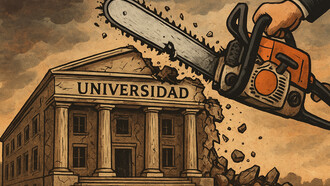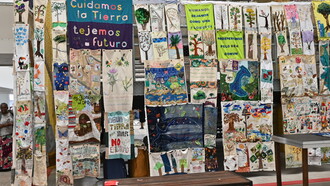BRICS+ raises hopes. Replacing the U.S dollar with another currency or basket of currencies for international trade is by no means easy. Moreover, Member States have diverging geopolitical interests. New alliances will not come overnight. Still, it can be hoped that through the many chinks in the system there will eventually be more room for something better.
With Donald Trump in the White House in Washington, much may be gaining momentum. The first victims of higher customs tariffs will be China, Canada, and Mexico. Whether and to what extent these countries will respond with countermeasures is still uncertain. What is clear is that in the long run, trade wars do not benefit anyone.
COP29 in Baku, Azerbaijan, was disappointing. How could it be otherwise in an oil-rich country with hundreds of fossil fuel lobbyists at the conference? Everyone is now hoping to get a better result next year, at COP30 in Belem, Brazil. For that, they are counting on President Lula da Silva to smooth out the diplomatic folds.
A war and genocide is raging in the Middle East. There is a dangerous war going on in Eastern Europe. Add to this the impending de-industrialisation and impoverishment of Western Europe and few reasons remain to be optimistic.
Yet pessimism is anything but a solution. Around the world, countries, organisations, and people continue to plot plans to achieve a peaceful and cooperative world. Some of these plans do not stand a chance; others may inspire to seek further.
It cannot be repeated enough how interesting and instructive are the many documents adopted at the U.N. General Assembly 50 years ago. Admittedly, even then the agreement of the countries of the North was not self-evident, especially when it came to social progress, a new world economic order, the rights and duties of States or a right to development. Those texts were prompted by a growing indignation at inequality, unfair trade relations, too little development aid, continuing colonial domination. Interesting studies with concrete action plans emerged, think of Willy Brandt's reports.
Hope
One can be dismissive of the many morally lofty texts of the U.N. As long as these texts exist and are approved by a majority of Member States, however, they show that there is indeed hope, that cynicism is not winning, that peace and social justice can be worked for.
There was hope 50 years ago, the time of decolonisation, after the Bandung Conference in 1955, the emergence of the 'non-aligned countries' in 1961, the G-77 in 1964 at the first UNCTAD Conference. The U.N. also adopted 'Decade Programmes' on development in the South. Such hopes were gradually dashed, with the crisis of the late 1970s and introduction of neoliberalism in the early 1980s.
Yet all is not lost. I want to talk here about two new and progressive initiatives to revive the thinking of the past. That this can help break contemporary doom and gloom thinking will not escape anyone's notice.
A new international new world order
It is exactly 50 years since two texts were adopted in the U.N. General Assembly—a Declaration and an Action Plan to change the world's economic relations.
It is somewhat touching to read today the 'demands' of the countries of the South, because they should be so obvious: sovereign equality, self-determination of peoples, interdependence, common interests, cooperation. There were calls for the reduction of inequality, economic and social development, peace and justice. Everything is already in the Charter of the United Nations itself. We know nothing came of it.
The U.N. writes regular reports on how those and other texts have fared, and today it can only be concluded that there is a multiple crisis, that the Sustainable Development Goals programme is not being met. A few countries in Asia are experiencing growth, but there is no global convergence. The debt burden is unbearable.Hunger and food insecurity are on the rise again in Africa. Natural disasters follow one another. In 2023, a conference was held in Havana, in collaboration with Progressive International, to revive the old text.
The new text covers 1) Climate, energy, and raw materials; 2) Industry, labour, and international trade; 3) Monetary policy, debt, and finance, 4) Technology, innovation, and education and 5) Governance, multilateralism, and international law.
The basic demands remain exactly the same as those of 50 years ago, taking into account global changes. They now include seed banks, a circular economy, tax justice, alternative currencies, decolonising knowledge, public digital infrastructure, disarmament, abolishing ISDS (this is the conflict resolution within the World Trade Organisation), reparations, among others. And it is also about a 'right to development'.
Right to development
The declaration on the right to development was adopted in 1986. It is a rather ambiguous text, a kind of hinge between the old development thinking and the new neoliberal thinking. But just as the World Bank is constantly doing with progressive texts and concepts to make them fit its stall, this text too can perfectly be turned into a progressive project. Development then becomes an inalienable human right for which equal opportunities must be created—a right for nations as well as individuals.
In the 1986 text, however, this was no longer linked to other international economic relations but to the shift from the collective to the individual. With poverty reduction, inequality between individuals becomes more important than inequality between countries, it was thought. It is people who become the subjects for development, and so the disappearance of national development is cloaked in humanistic and humanitarian values with a 'holistic' concept of development. However, new rights other than those in the International Pact on Economic, Social, and Cultural Rights were not offered in it.
Yet it is this old text that is being taken out again today and may indeed provide a new approach. On 13 November 2024, a binding 'Draft Convention on a Right to Development' was adopted in the third committee of the General Assembly. The text was prepared by a working group of the U.N. Human Rights Council.
Such development, it is now argued, is a common concern of all humanity. Standing in the way include poverty and inequality within and between countries, climate change, (neo)colonisation, racism, and conflict. The Right to Development is an inalienable human right of all people and peoples, a prerogative of nations and individuals. Development is seen as both a means and an end for sustainability and must ensure peace and security.
The role of government as well as international solidarity is underlined. The right to development goes hand in hand with a right to participation and a fair distribution of its benefits. Article 13 stipulates a duty of cooperation to achieve a higher standard of living, with "common but different responsibilities". This right to development cannot be separated from all other human rights and U.N. resolutions adopted throughout history.
So this text does not introduce any new rights, nor is it a mere reverting to all the positions of the past. It can, however, be seen as a new attempt to work on both national and human development. In this sense, it is particularly interesting because it offers an opportunity to move away from the pure market forces of neoliberalism. There is once again a role for the state and the necessary international solidarity is emphasised.
Economic and social development, in North and South—as the SDGs already prescribe, by the way—is necessary to achieve social justice, with poverty reduction, comprehensive social protection, public services, and labour justice. The countries of the North voted against this project because they only see in it an attempt to push aside classical human rights in favour of 'development'. It was a vote that once again showed a deep divide between North and South.
Development
No one will deny that the post-World War II and decolonisation development project failed. The best proof is that there are 46 'poorest countries' now, compared to just 25 at the time that categorisation was introduced in 1971. Development aid never reached the promised 0.7%. Our development agencies carry on as if nothing is wrong, while budgets take another dive. The focus is now on individual projects that make people 'feel good' because at least they 'do something'.
The countries of the South are trying, as best they can, to work on a different project. The success of countries like China, India, Brazil, or Mexico shows that it is perfectly possible, how much criticism can possibly be levelled at those very different countries.
The unwillingness to help countries in the South is abundantly clear, and this was once again evident in Baku. Today, a new Conference on Financing for Development is being prepared for early July in Seville, Spain. A second U.N. Summit on Social Development will take place in Doha, Qatar, in late 2025.
Again and again, these are great opportunities to continue and participate in the progressive initiatives out there. Hopefully this can also be picked up by parties and movements in Belgium. It is urgent to give support to all those who do not give up but optimistically continue working on what is possible, step by step. Because the demands are simply self-evident and urgent.















